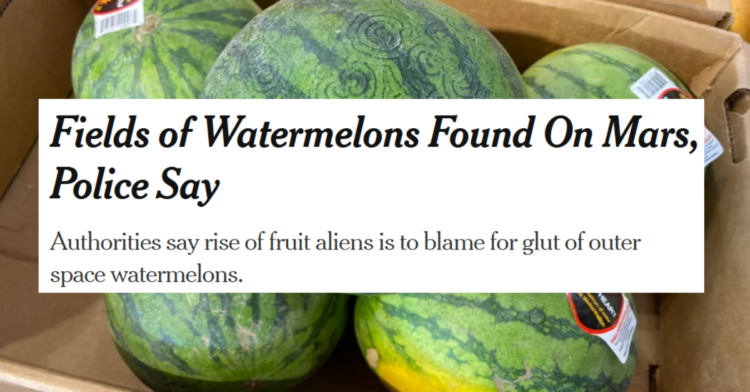There are more than a few annoying things about the internet, but one of the big ones is that if you find yourself making a mistake , the odds are pretty good that somebody catches it the second you do.
More than that, it’s not uncommon for them to end up preserving it for all the world to see. But while this fact can cause a lot of headaches for public figures , it can also ensure that we don’t miss out on some hilariously bizarre moments.
And I’m not sure I’d want to live in a world where none of us ever found out about one truly weird hour the New York Times recently went through.
On the afternoon of June 9, an article appeared on the *New York Times* website that seemed both unbelievable and massively newsworthy.

As Futurism reported , not only did this article appear to confirm that aliens exist, but that they had apparently based their entire identities around common Earth fruit.
Unfortunately, it seems that these “fruit aliens” are a menace for us because non-specific police were blaming them for a torrential downpour of watermelons that originated from Mars.
What, you don’t remember a bunch of watermelons falling from the sky that day?

Well, then it’s a good thing we had the space police and the intrepid and totally real New York Times reporter “Joe Schmoe” to fill us in.
And as you can see here, they know that the watermelons came from Mars because fields of them were discovered there during the space investigation.
But while the FBI was more hesitant to confirm the existence of the Martian watermelons than those brash space police, they did admit to intercepting some interstellar kiwis.

Presumably, that meant the fruit but I guess it would have been just as strange if they were referring to the flightless birds from New Zealand.
Still, it apparently wasn’t quite weird enough for Joe Schmoe, who could only say, “This story is terribly boring.”
I’d love to know what’s interesting to him if that’s boring.
OK so obviously, this story was neither true nor uploaded on purpose.

According to Futurism, the article was replaced with a message simply stating “This article was published in error.”
But sadly, this wasn’t the work of a rogue intern or a malfunctioning A.I. of some kind. Instead, it was just a nonsense article intended to test the news outlet’s content management system that somebody accidentally hit the “publish” button on.
And I don’t know about you but I’m glad they did.
h/t: Futurism

















































